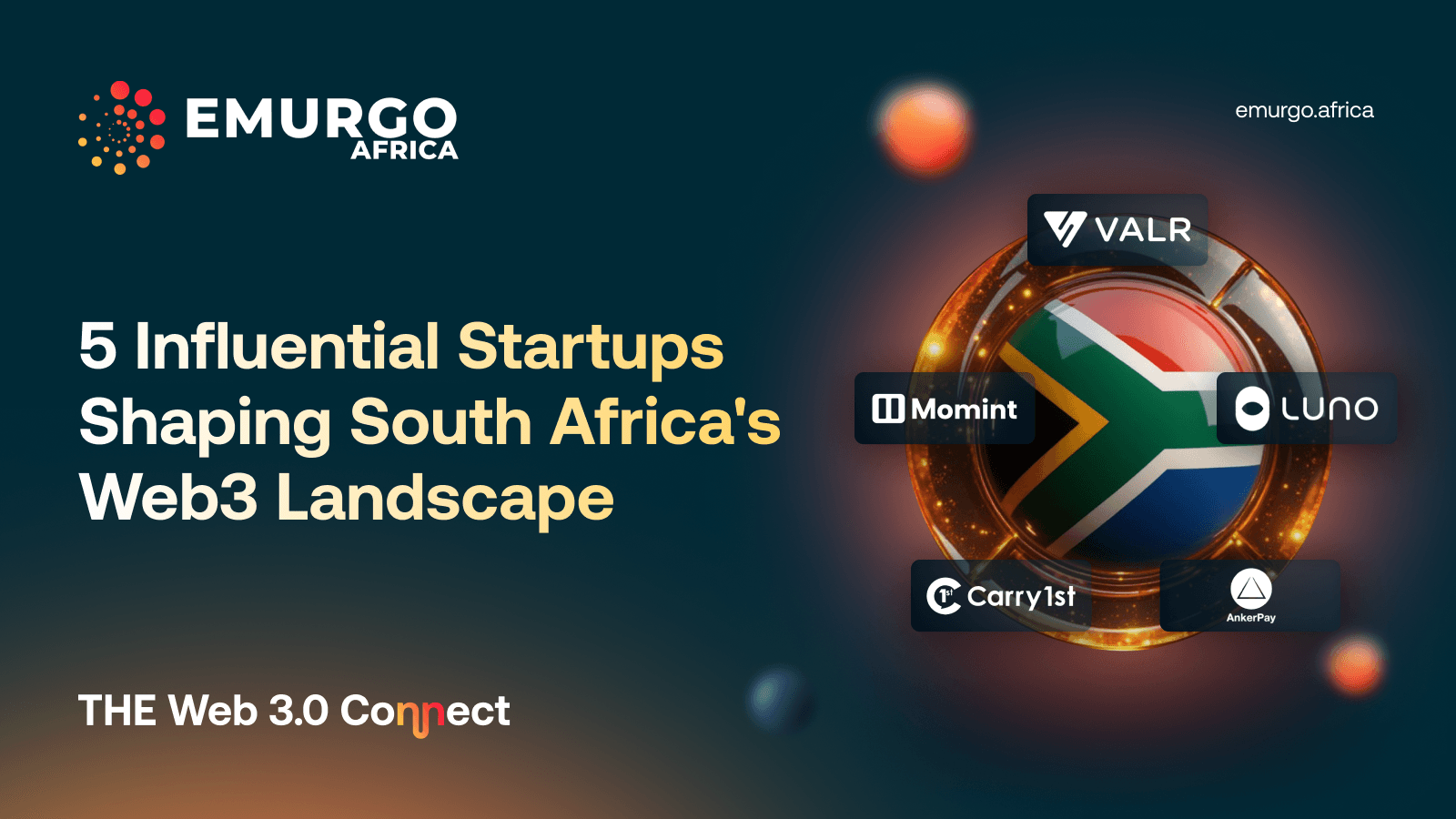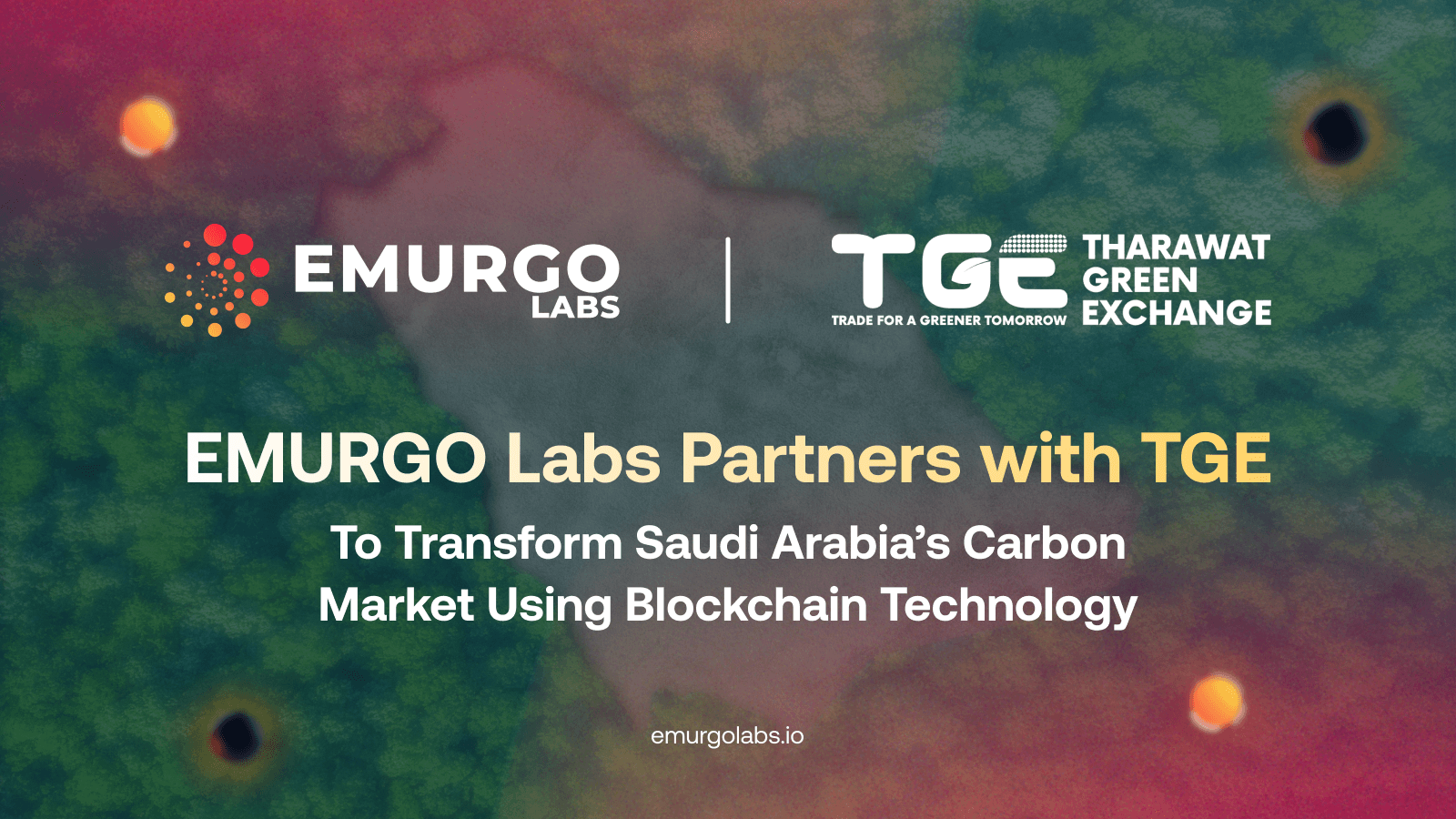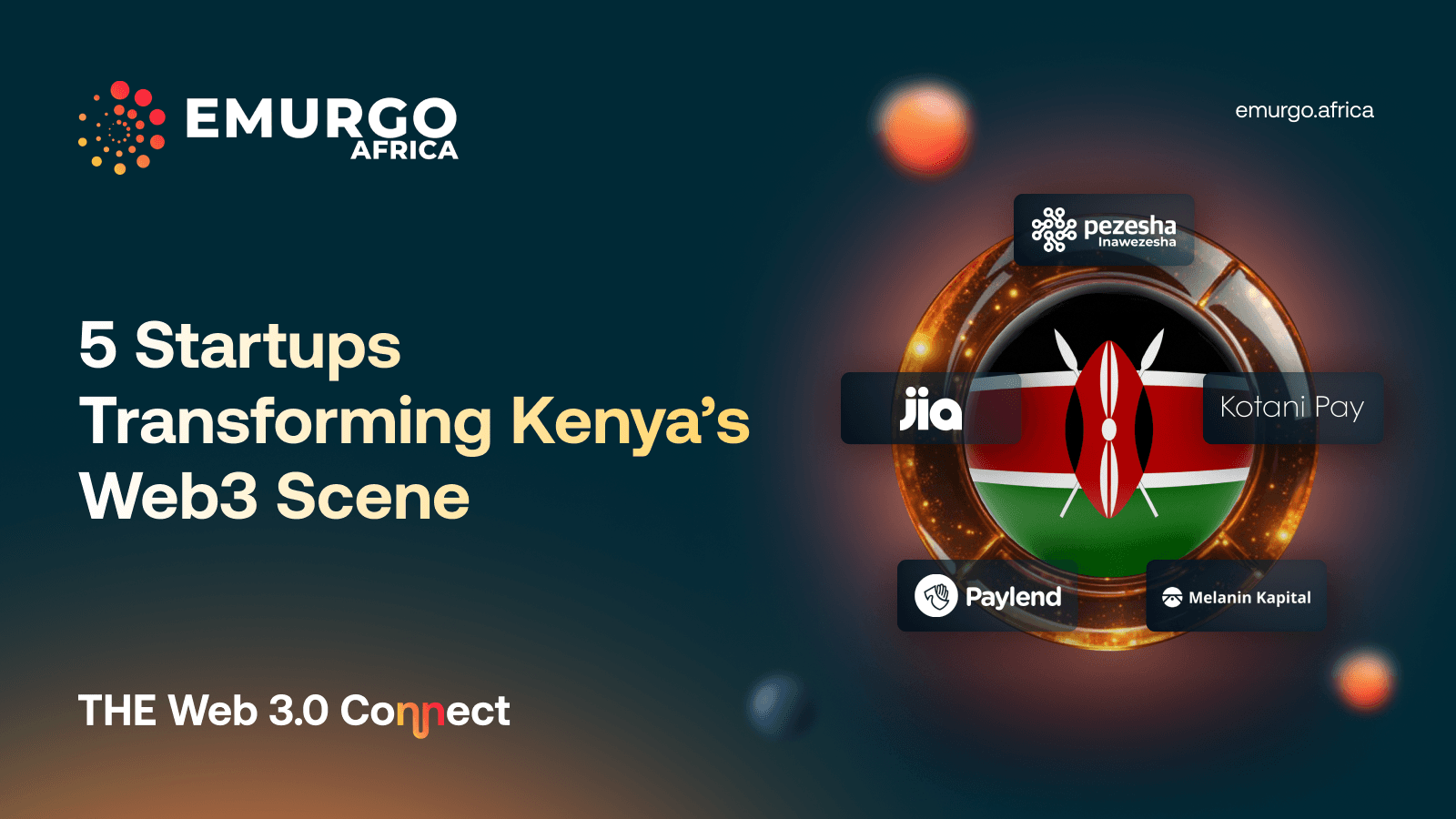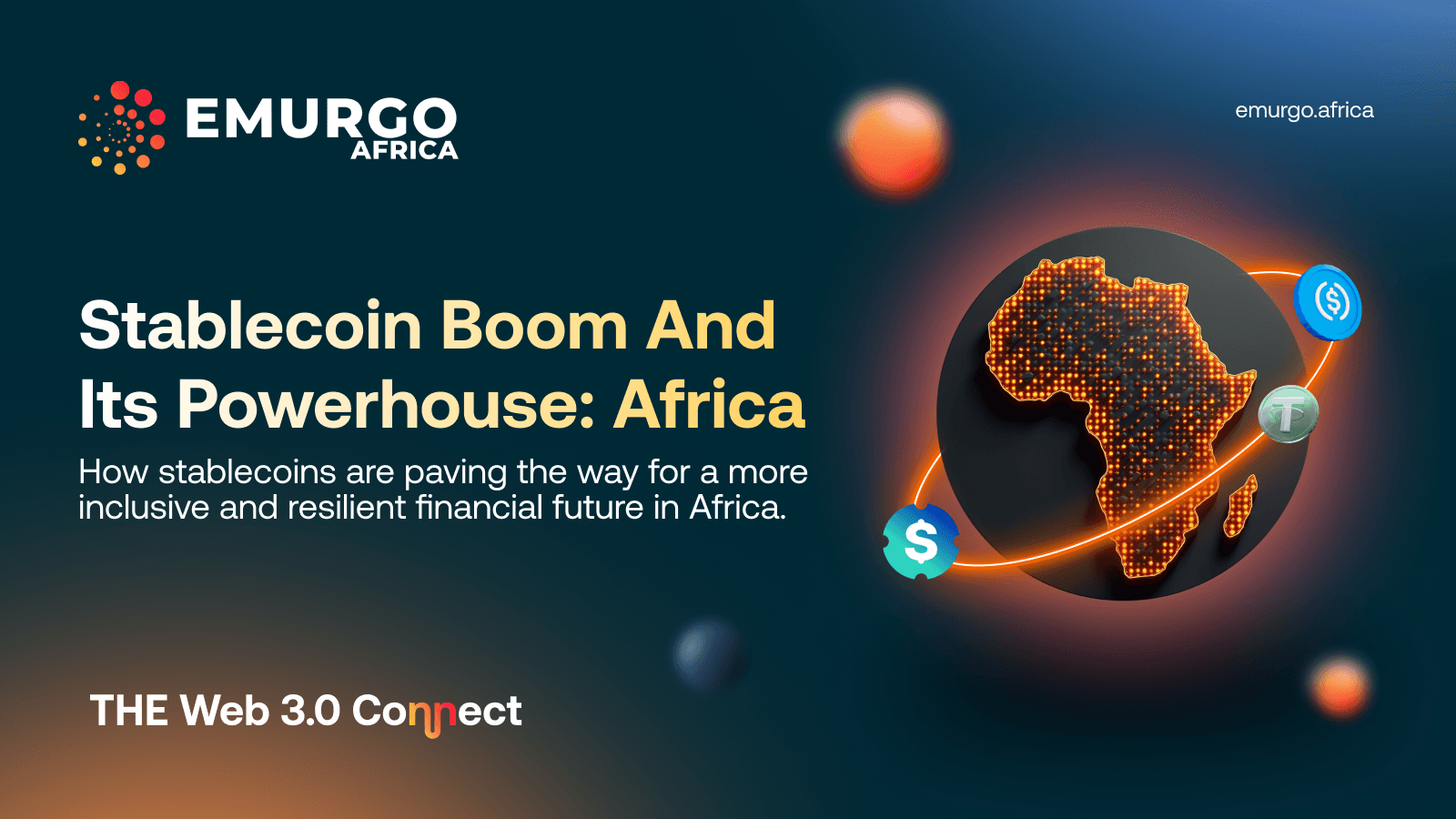By Shogo Ishida and Yosuke Yoshida, Co-CEOs, EMURGO Africa
As blockchain technology continues to disrupt traditional industries and enable new forms of digital interaction, South Africa is positioning itself as a key player in the global Web3 ecosystem.
As Africa's largest economy, South Africa has emerged as the continent's second biggest cryptocurrency market, with around $26 billion worth of crypto transactions over the past year - same as GDP of neighbouring Zimbabwe. The country is experiencing significant growth in licensed companies and a surge in institutional-scale activity.
In this edition, we’re shining a spotlight on five startups that have recorded a huge impact on the growth of the Web3 industry in South Africa.

VALR is South Africa’s largest cryptocurrency exchange by spot trading volumes, founded in 2018 by Farzam Ehsani, a former blockchain lead at Rand Merchant Bank (RMB). Since its launch, VALR has become a cornerstone of South Africa’s growing crypto ecosystem, offering a secure, user-friendly platform for buying, selling, and trading a wide range of digital assets.
In 2019, VALR received its first seed funding of $1.5 million. This was followed by series A funding of $3.4 million in 2020 and a series B funding of $50 million in 2022. This raised the company's valuation to $240 million, more than 10 times its valuation in 2020.
VALR's first customers signed up in December 2018, and the exchange launched its first ZAR (Rand) trading pairs in June 2019. Since then, VALR has consistently added trading pairs and coins, and now offers traders more than 75 cryptocurrencies on its platform.
The exchange has a daily spot trading volume of $11.5 million.
The firm serves over 600,000 retail customers and over 1,000 institutional customers globally. About 75% of these customers are from South Africa. It has partnered with Circle to grow stablecoin adoption in the country.
VALR's liquidity and flexible API have made it an attractive option for other brands looking to enter the crypto space with a white-label offering. It has also prioritized the safety of funds, with security and compliance being top priorities.
In April 2024, VALR received regulatory approval from South Africa's financial watchdog, the Financial Sector Conduct Authority (FSCA), as a Crypto Asset Service Provider (CASP). This made VALR one of the first crypto asset platforms to receive regulatory approval in both categories in South Africa.
The platform has competitive fees and advanced features, such as API access for developers and institutional-grade security measures, including multi-signature wallets and encryption. With a focus on both retail and institutional investors, VALR is working to bridge the gap between traditional finance and the burgeoning world of digital assets.
One of VALR’s key innovations is its integration with decentralized finance (DeFi) protocols, allowing users to leverage their crypto holdings for yield generation and other DeFi applications.
2. Momint: NFTs, RWAs and Clean Energy

Momint is making waves in the rapidly growing NFT space. Founded in 2021 by Ahren Posthumus, the platform enables creators—such as artists, musicians, and content producers—to tokenize their work and sell it as NFTs.
The platform allows creators to mint NFTs with low fees, ensuring that even emerging artists can participate in the booming NFT economy. Buyers can purchase and trade these digital assets, with blockchain ensuring provenance and authenticity.
By leveraging blockchain technology, Momint also offers a transparent and decentralized marketplace for Real World Assets where users can connect directly with buyers, bypassing traditional gatekeepers.
Momint is also contributing to the growth of Web3 in South Africa by integrating the Internet Computer Protocol (ICP) blockchain to enhance its business operations. This positions the startup to gain, retain, and expand its market share in the international digital economy.
Momint offers consumers and investors a safe platform for owning and trading energy assets on the blockchain. The ICP's technology provides several advantages that make it well-suited for Momint's real-world asset tracking applications.
In July this year, Momint secured a $50,000 grant from the DFINITY Foundation, a Swiss non-profit organization known for its focus on blockchain. This followed last year’s seed funding of $1.25 million from 10 investors.
As at October 2024, Momint had more than 54,000 user wallets and $1.95 million in market volume, according to data on its website.
A key feature of Momint is its commitment to environmental sustainability. The platform utilizes an energy-efficient blockchain to minimize its carbon footprint, addressing one of the primary concerns surrounding NFTs.
The firm says it uses layer 2 blockchain Gnosis, which offsets 10 times more carbon than it generates. It adds that certificates on Momint are over 300 times more eco-friendly than typical transactions and millions of times more energy-efficient than transactions on Ethereum or Bitcoin blockchains.
Momint has seen strong traction in its Solar Investment Product for the second quarter of 2024, with 1,770 payouts totalling $7,500 to solar certificate holders, delivering a 12%+ return on their solar investments annually.
In July last year, the firm started allowing customers to use cryptocurrency in their Momint wallets to purchase shopping vouchers, which are accepted by over 10,000 retailers in South Africa.
The company is also in the process of obtaining a CASP (Crypto Asset Service Provider) license and is exploring the launch of an eZAR (or digital Rand) to provide customers with seamless crypto-to-account withdrawal and everyday spending capabilities.

Luno was the first crypto exchange in Africa and is often credited with spearheading cryptocurrency adoption in Africa. Founded in 2013 by South Africans Marcus Swanepoel and Timothy Stranex, Luno started as a Bitcoin wallet and exchange but has since expanded to offer a broad range of digital assets and cryptos.
Luno is contributing to the growth of Web3 in South Africa by allowing South Africans to trade various cryptocurrencies, some of which are directly tied to Web3 projects. This enables them to invest in and participate in the growth of the Web3 space.
Luno has raised $13.8 million to date, and was the first crypto firm to receive the FSCA crypto license in South Africa.
In 2023, the firm said since inception, it has recorded 388 million digital asset transactions on its platform, worth $37 billion across more than 40 countries. In South Africa, cities with the highest concentration of users are Johannesburg, Cape Town, Pretoria and Durban. Luno has a daily spot trading volume of $4.8 million.
Luno’s user-friendly platform is designed to cater to both beginners and more experienced traders. The exchange includes features like instant buy/sell options, advanced trading tools, and a secure wallet to store digital assets.
Luno also focuses on education, offering a suite of resources aimed at helping users understand the intricacies of blockchain technology and crypto investing.
One of Luno’s most significant contributions to the African market is its focus on financial inclusion. The platform allows users to convert local currencies into crypto, providing a hedge against inflation and currency instability—a particularly valuable feature in many African economies.

Carry1st is a game publisher that combines the power of mobile gaming with blockchain technology to create new opportunities for gamers and developers alike.
Founded in 2018 by Cordel Robbin-Coker, Lucy Hoffman, and Tinotenda Mafurutu, Carry1st has established itself as one of the leading mobile gaming platforms in Africa. The company’s mission is to bring world-class gaming experiences to African audiences while integrating blockchain features such as tokenized assets and NFTs.
Carry1st’s platform enables gamers to own and trade in-game assets, creating a decentralized gaming economy where players can benefit from their time and effort spent in virtual worlds. In 2023, it had over 2 million monthly active gamers. It is present in Nigeria, South Africa, Kenya, Ghana, Morocco, Egypt, Algeria and Tunisia.
The company’s focus on mobile gaming is particularly strategic, given that mobile devices are the primary access point to the internet for many Africans. Carry1st also offers developers a way to monetize their games through blockchain-based micropayments, creating new revenue streams in regions where traditional payment methods are limited.
Carry1st’s success is underscored by its flagship game, SpongeBob: Krusty Cook-Off, which has been a significant hit in Africa. The company has also raised over $60 million in venture capital funding and partnered with global gaming studios to bring gaming content to African users.
5. AnkerPay: Crypto ATMs and PoS Systems

Founded in 2018, AnkerPay is significantly contributing to the growth of the Web3 industry in South Africa by providing a comprehensive ecosystem that facilitates the adoption and utilization of cryptocurrencies and blockchain technologies.
AnkerPay has established a network of cryptocurrency ATMs across South Africa, enabling users to buy and sell cryptocurrencies using fiat currency. This infrastructure enhances the accessibility of digital assets, allowing more individuals to participate in the crypto economy.
The startup offers payment processing solutions through the AnkerPay Wallet, a user-friendly, multi-cryptocurrency wallet supporting Bitcoin, Ethereum, Litecoin, Dash, Dogecoin, and Anker's native token. This wallet enables users to securely store, manage, and transact with their digital assets.
AnkerPay Point of Sale (PoS) Systems allow merchants to accept various cryptocurrencies as payment, seamlessly integrating with existing PoS software. This integration facilitates everyday transactions in digital currencies, promoting broader merchant adoption.
Collaborations with cryptocurrencies like Dash have been pivotal in expanding the digital currency's ecosystem within Sub-Saharan Africa. Such partnerships have focused on increasing merchant and user adoption, thereby strengthening the overall Web3 infrastructure in the region.
By offering alternative financial solutions, AnkerPay addresses the needs of unbanked and underbanked individuals in South Africa. Their services provide access to digital financial systems, fostering financial inclusion and empowering users with greater control over their finances.
Through these initiatives, AnkerPay plays a vital role in nurturing a robust and inclusive Web3 environment in South Africa, driving the adoption of decentralized technologies and contributing to the growth of the digital economy.

DISCLAIMER: The information in this content (website or other form) does not represent an offer or commitment to provide any product or service. The analysis, opinions and estimates expressed in this content are those of the respective authors, and may differ from those of EMURGO Africa and/or other EMURGO Africa employees and affiliates. Copying, re-publishing or using this material or any of its contents for any other purpose is strictly prohibited without prior written consent from EMURGO Africa.




